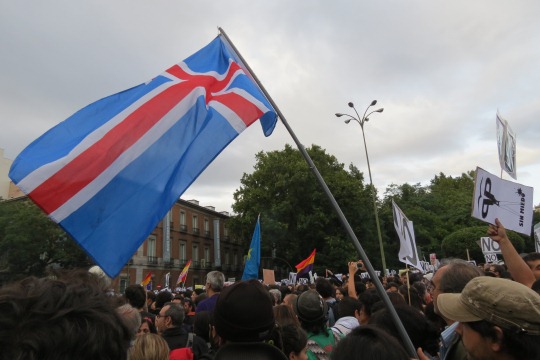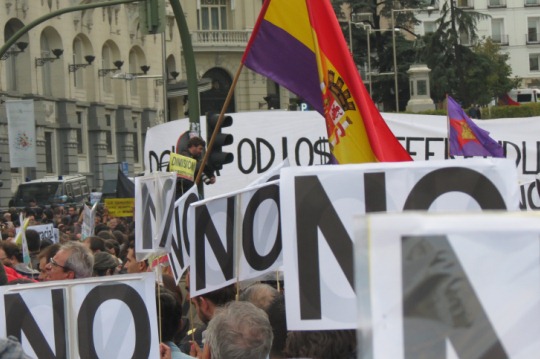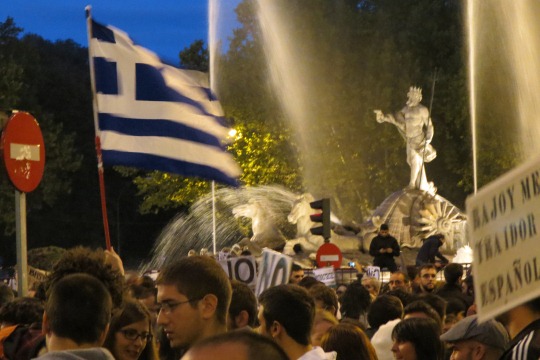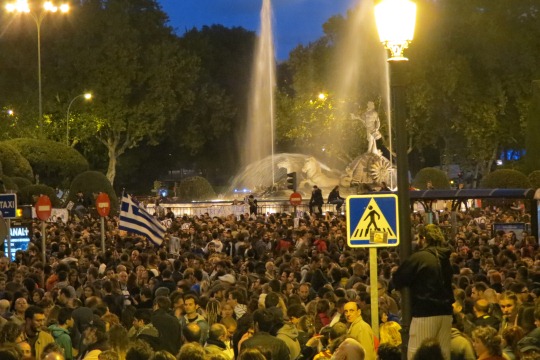No sooner than arriving at the grand “storm the Congress” demonstration in Madrid did we begin making comparisons to demos back home. The cause, after all, is similar if not the same, and Israel’s J14 movement took much inspiration from Spain’s M15. These days, anger is reawakening on Spain’s streets, with a major difference: here, in Madrid, there’s a huge demonstration, the third in a single week. There, in Tel Aviv, there isn’t.
This was not, however, an altogether peaceful summer, not at all. This is the summer in which Israeli police turned extra violent against social justice protesters, arresting more than 90 of them in one night, and the summer in which an activist set himself on fire in the midst of a demonstration. We have fresh memories of both hope and turmoil on our streets, and the march of thousands up the Paseo Del Prado to Neptune’s fountain invoked the former, the sight of police waiting by black Marias – the latter.
Differences were just as evident. Here was a greater mixture of generations than what we see back home. The Spanish struggle is distinctly multi-generational.
It is also more directly focused on the government. Last summer’s struggle succeeded in removing Zapatero’s government and bringing new elections. The new prime minister, Mariano Rajoy, recently declared an austerity plan, which the protesters regard as theft of the public’s funds in favor of bankers and decision-makers who are truly to blame for Spain’s debt. “Rajoy, recuerda, tenemos una cuerda!” they cry, “Rajoy, remember, we have a rope.”
No equivalent chant was heard in Israel. Leaders of J14 said from the outset that they do not seek to replace the government, but rather to change the system more fundamentally. On paper, Spain seems to prove them right: a change of government brought no peace to the masses here. On the other hand, the streets here are full, and the protest movement has matured. Its new manifesto, published last week, addresses local and global issues confidently and poignantly.
A final notable difference between this demonstration and those back home was the complete absence of the national flag. In Israel, a national flag flown in demonstrations indicates that the movement represents the vox populi, and dismisses accusations of non-patriotism. Here, instead of the yellow and red of Spain, we noticed the red, white and blue of Iceland.
A young student named Stefania, who waved it, rears from Majadahonda in Madrid’s suburbs. She feels that Spain should emulate Iceland, whose people resisted a bailout plan and preferred to prosecute the bankers who drove it into crisis. “We need a referendum and a new constitution, so that we will have real change, a real democracy, and real representation. Besides,” she added, “the flag helps all the people who came from Majadahonda know where to gather.”
Another flag that stuck out was the tricolor of the Second Spanish Republic, the one that waved over this city for three entire years, while Franco’s forces besieged it and bombed it, until its fall in 1939.
We asked Rafael, who held it, whether he regards this struggle as related to the historical one. “I am holding it up against the the royal family,” he explained. “The parasites are still feeding on us, even after all these years, and this is what I find most offensive.”
At first glance, an anti-monarchist statement seems peripheral at best to the message of the global Occupy movement, but deeper contemplation reveals it to be its quintessence. What is the Israeli social justice movement up against, if not a handful of over-privileged families? Our 0.001% were never elected, and yet enjoy limitless power over our economy and politics and endless benefits. A thin line runs between monarchs and tycoons.
Finally, there was the Greek flag.
Juan, a schoolteacher from Madrid, volunteered an explanation: “I believe that we are following in the footsteps of the Greeks,” he said. “The adjustment, the deficit, the bailout… both governments fall swiftly in line with whatever order comes from Brussels or Germany, and in both cases they ignore the true meaning of democracy.”
We asked Juan whether he foresees an escalation in protester violence in Spain, such as was seen over the weekend in Greece. “There are different stages to a struggle,” he said. “It was important for us to start with civil disobedience and non-violence. I think we are moving forward step by step and it’s a natural evolution. Things are sure to become rougher further down the road. There will be more fearless response from the demonstrators. It’s part of the struggle.”
The demonstration did end with some physical confrontations between police and activists, but those only came about late at night, after most of the crowd dispersed, and did not reach the level of last Tuesday’s violent eruption. All in all, the Madrilenos left the square to join a typical Saturday night full of beer and pinchos.
In Israel, oponents of the struggle pointed to full cafes as proof that it is a hoax. Here too the cafes are full, and yet no one can blame the Spanish, 25 percent of whom are unemployed, for inventing up their plight. What can compensate for hard times better than the love of life itself? In a truly spirited nation, that love isn’t easily uprooted, and nor is the rebellious spirit.






